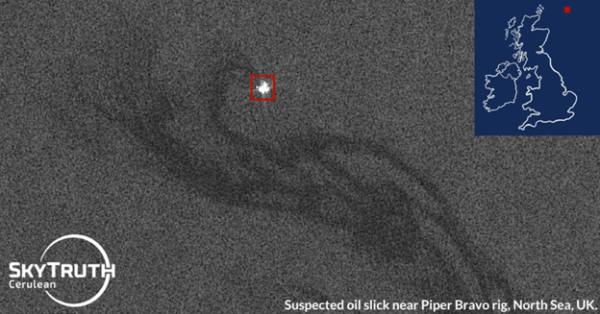A new report from conservation group Oceana UK has been published revealing the true extent of oil pollution.
The report titled ‘Sea Slick: The true scale and impact of chronic oil pollution in UK seas’ says oil pollution in UK seas has been “significantly underestimated due an opaque system of self-reporting by oil companies that allows ‘spills’ to be reported separately from ‘permit breaches’, despite both resulting in extensive oil pollution”.
Underreported oil contaminations
Currently, oil companies must report both accidental oil spills and intentional discharges of so-called ‘produced water’ – a byproduct containing oil and other toxic chemicals – which can be released under permit. However, Oceana UK reports that breaches of these permits, despite representing considerable oil contamination, have typically been excluded from external analysis and scrutiny.
Consequently, the report writes that levels of oil pollution have typically been significantly underestimated. The findings state ‘permit breaches’ are added to ‘accidental spills’, the total volume of oil spilt into UK waters since 2014 increases by 43%, and more than doubles the volume between 2021-2024. In addition, it was found nearly a third (32%) of the reports of permit breaches for ‘produced water’ failed to include the volume of oil discharged – meaning true level of pollution is likely to be even higher.
A continued problem
Overall, there was a 36% increase in the average concentration of oil in ‘produced water’ released into UK waters between 2016 and 2020.
Since 2014, less than 2% of all oil discharge permit applications have been rejected. Of the permit breaches reported between January 2011- May 2024, less than 1% were investigated.
With spills being left to companies to self-report, the Offshore Petroleum Regulator for Environment and Decommissioning (OPRED) only inspected 15% of oil and gas infrastructure in 2023. After a new Freedom of Information request submitted by Oceana revealed this was down from 25% in 2022.
To uncover the extent of oil pollution, Oceana analysed published data on oil and chemical releases, which are collated and published by the Department for Energy Security and Net Zero on the Integrated Reporting Service. The data available includes times, dates and locations of spills and releases, the companies responsible, the tonnes of oil spilt (if given by the oil company), the source or cause of the spill and whether a formal investigation was carried out. The UK Energy Portal includes data on the number of discharge permits granted and refused, but does not include reasons given for decisions. Furthermore, data on enforcement activity was sourced from the department’s public record of enforcement and convictions. The published data was supplemented by information on the number of inspections taking place on offshore infrastructure, acquired through a freedom of information request.
Hugo Tagholm, executive drector of Oceana, said: “No one except oil insiders can be sure of the true scale of it.”
“Given so few sites are actually inspected, it is out of sight out of mind, even if people are caught, there is little enforcement.”
Between January 2021 and May 2024, just five companies were responsible for almost 84% of all oil discharged in breach of permit, Oceana UK found. Of the only two recorded convictions or fines in the last five years, one amounted to just £7,000, equivalent to 0.006% of the company’s profit for the year, or 1.5 hours of the CEO’s time.
Commenting on the findings of Oceana’s report, Dr Rosie Williams, Postdoctoral Researcher at the ZSL’s Institute of Zoology, says: “A growing body of research now recognises that the steady release of oil and other toxins into marine environments poses a huge threat to marine life. Substances such as PAHs and heavy metals can accumulate in animals and act as carcinogens and negatively impact the immune and reproductive systems. This bioaccumulation of chemicals is also a major concern from a human health perspective, as they enter our own food system. We need the government to do more to hold oil companies to account. The under-reporting from the industry on what toxins are being released into our ocean is an issue that must be urgently addressed.”
